Optimizing MVPs: Morressier’s Proceedings Manager
By late 2023, Morressier’s early-research management system - Proceedings Manager - was gaining traction in scientific publishing, but to secure Series B funding, the product needed to grow from an MVP into a powerhouse: with faster content collection, integrity checks, and reduced publishing times.
As the company settled on research integrity as a strategic priority, I led design optimizations for Proceedings Manager: polishing key flows and adding AI-driven integrity checks to the product, turning our MVP into a fast, reliable solution.
View ProductContributions
Transformed an MVP into a functional system, lead workshops, usability testing and supported on product strategy and technical documentation (PRDs, tickets)
Team
Group Product Manager + 4 Engineers
Timeline
4 Months (Dec 2023 - Mar 2024)
Proceedings Manager is a specialized CMS for scientific publishers: allowing them to speedily publish content through research content collection, data extraction and peer review workflows. When launched in 2022, it became an industry standout due to its promising tech capabilities and early research focus.
As the flagship product at the time of this project, it was the main driver for the business, seeking to...
Protect Customer Reputation
...by integrating Proceedings Manager with Morressier’s integrity solutions
Accelerate Customer Revenue
...by enabling them to quickly collect, process and publish scientific content in one tool only
Increase Morressier’s Market Share
...by hosting larger volumes of research through Proceedings Manager
However...Proceedings Management was still an MVP.
We were hitting a breaking point: users wasted hours re-uploading files, while slow metadata extraction delayed revenue by weeks. With Series B funding on the line, we had to deal with these pain points:
Unforgiving Upload Journey
Users couldn’t edit, add, or remove files before committing to upload batches of content, forcing repeated uploads to fix errors.
Slow and Inaccurate Metadata Extraction
Data extraction from uploaded content was slow (30 mins–4 hours) and error-prone, omitting information (e.g. emails) and adding delays.
High Support Dependency
Inaccurate extractions created endless support tickets as users struggled without proper system feedback.
Disconnected Product Experience
Content uploaded to the MVP faced integrity risks, since it lacked integration with Morressier's standalone integrity tools at the time.
To successfully optimize Proceedings Manager, I needed to find a way through that balanced both business goals and product pain points. I began my work by mapping the MVP's end-to-end experience along with Product and Engineering, to make our optimization process as realistic as we could.
Defining A Direction
To have full visibility of the pains across the Proceedings Manager journey, I gathered multiple representatives from Product, CS, Design and Engineering teams to join forces in a Journey Mapping Workshop:
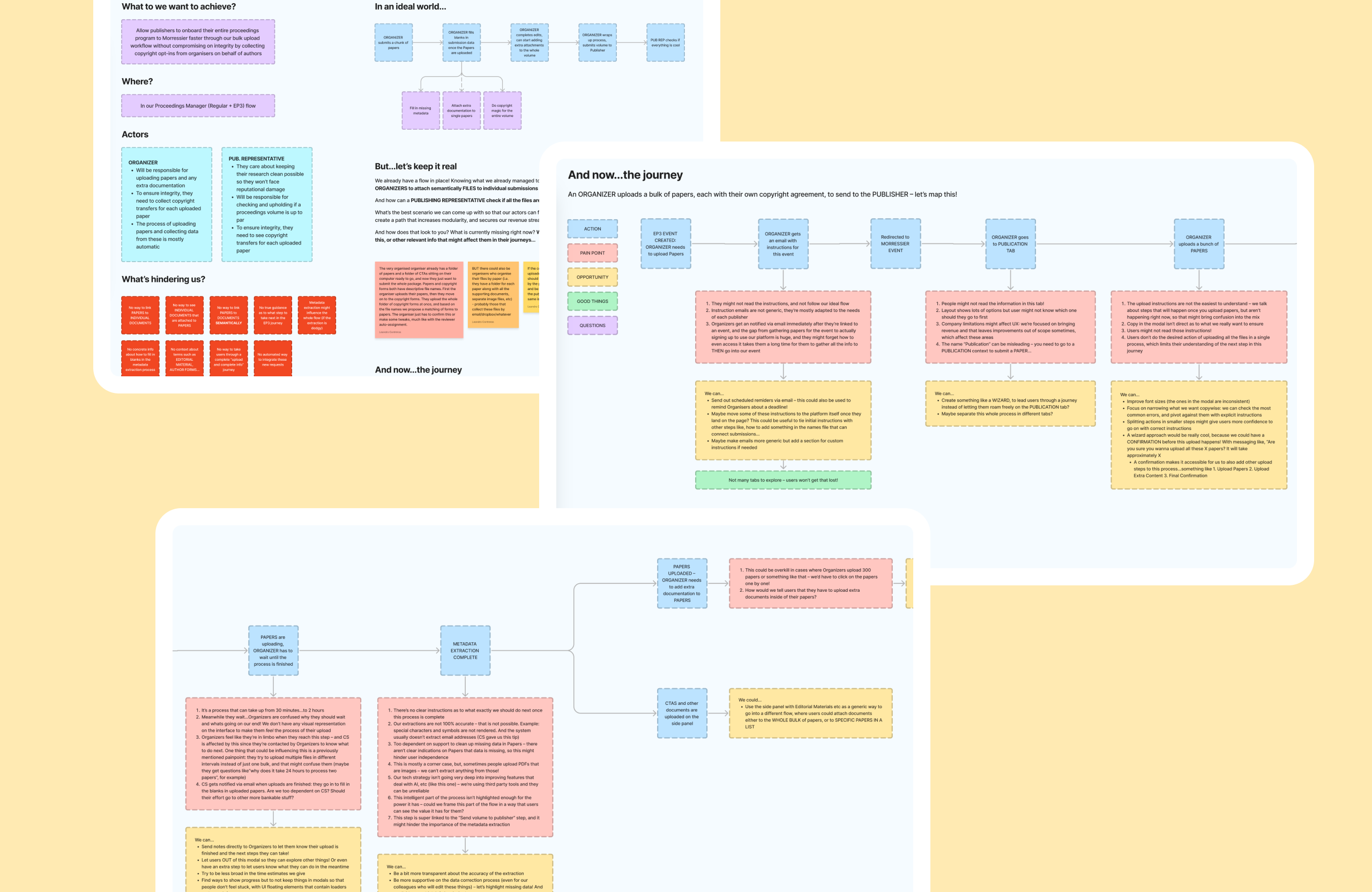
Participants first shared individual perspectives on Proceedings Manager's biggest structural issues. Together, we mapped these onto the current workflow: uncovering new challenges while identifying scalable solutions aligned with our goals. This process clarified dependencies and defined our scope.
First Iteration: Achieving The Balance
After understanding what we could achieve with the tech stack currently available, we realized that:
- We can’t improve the accuracy now, but we can reduce extraction times;
- According to our high-level estimations, there’s no constraints to stop the team from redesigning new upload flows;
- The team had the capacity to do most of the extra improvements that were negotiated between Design, Product and Engineering;
- It isn’t possible to do integrations with all of our Integrity Products, but we can find ways to connect all the pieces!
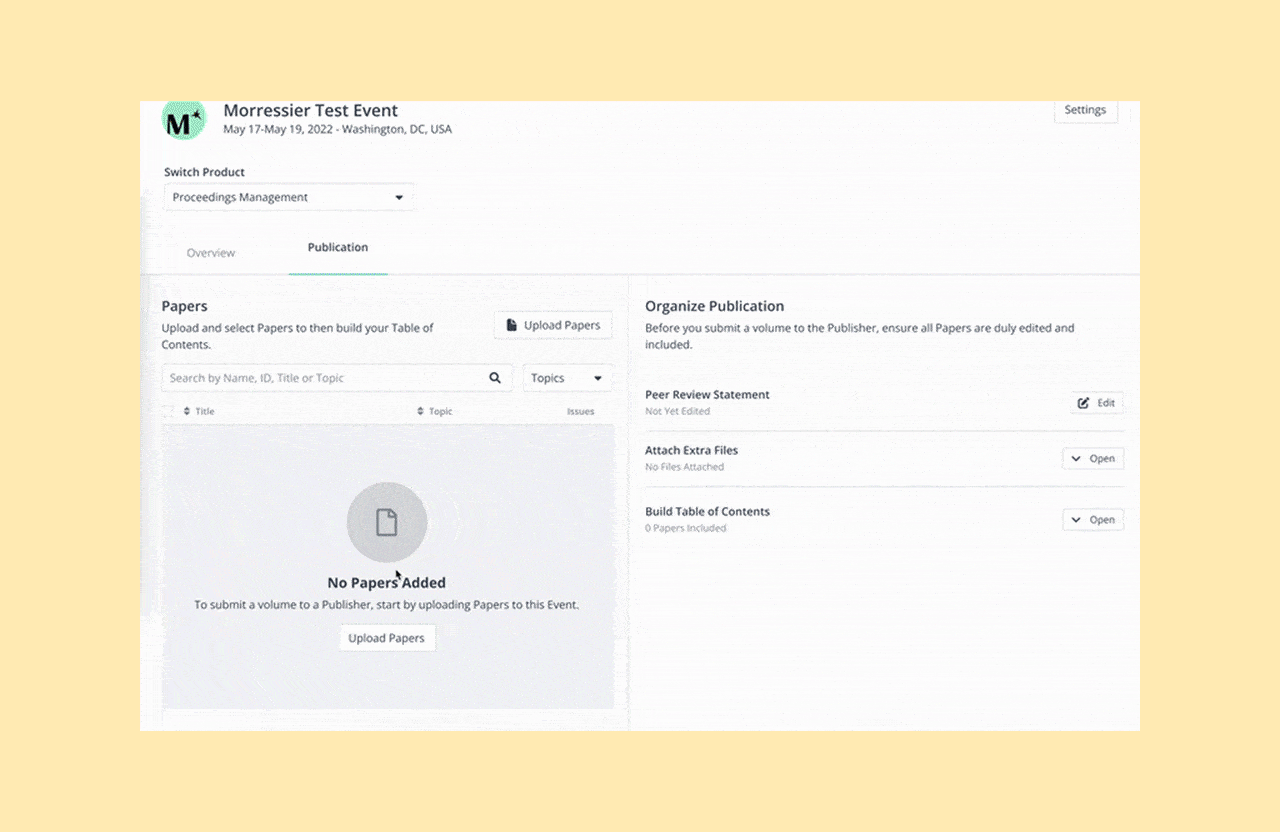
New Upload Journey
To reduced re-uploads and improve data quality, I transformed Journal Manager's content collection flow into a three-step flow with:
Batch editing: Add/remove files before final upload;
Duplicate detection: System now flags repeated research to uphold integrity;
Guided feedback: Clear expectations at each step to prevent mistakes.
Integrity Connections
We started with minimal, but effective Integrity integrations: my focus was to make the essentials of the Integrity experience complement the journey that users go through in Proceedings Manager.
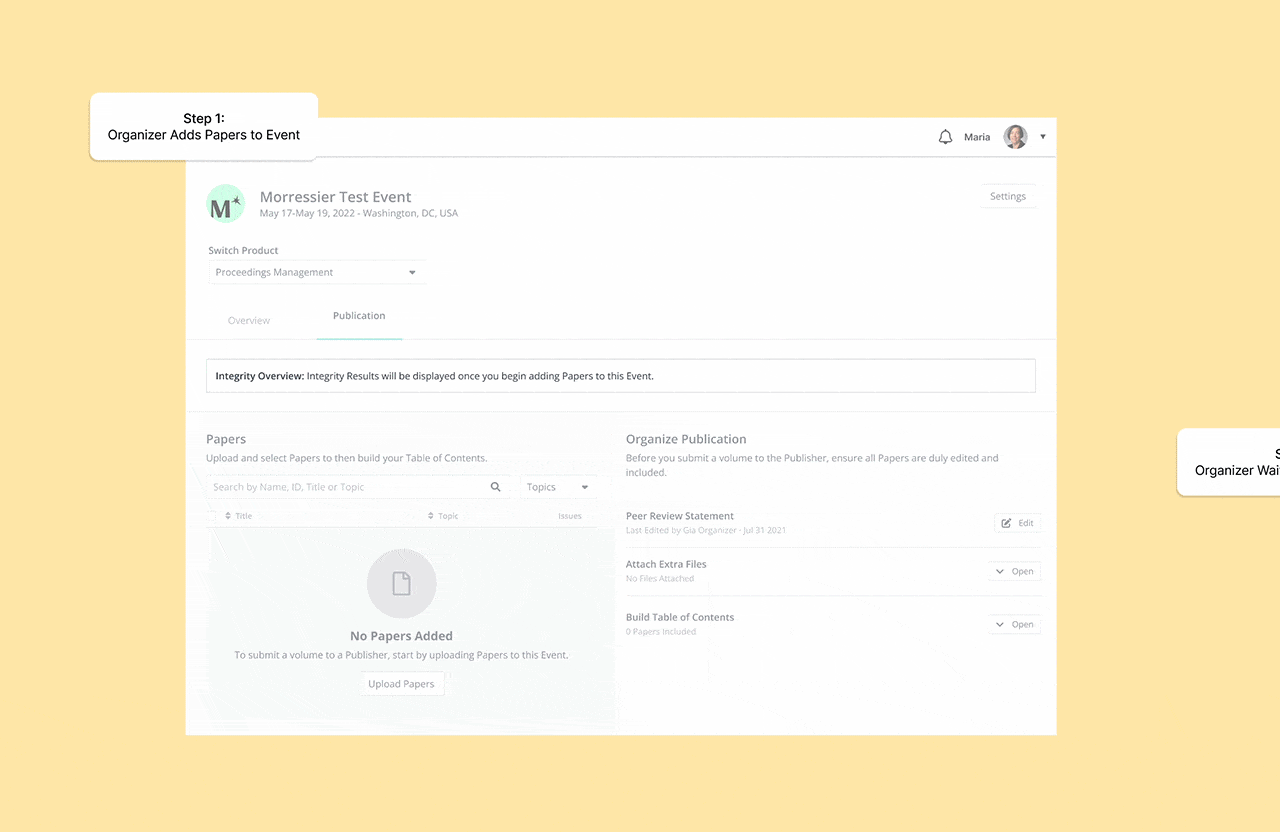
Integrity Overview
Users can quickly scan integrity issues across uploaded content via an overview panel, with direct access to advanced searches and dashboards.
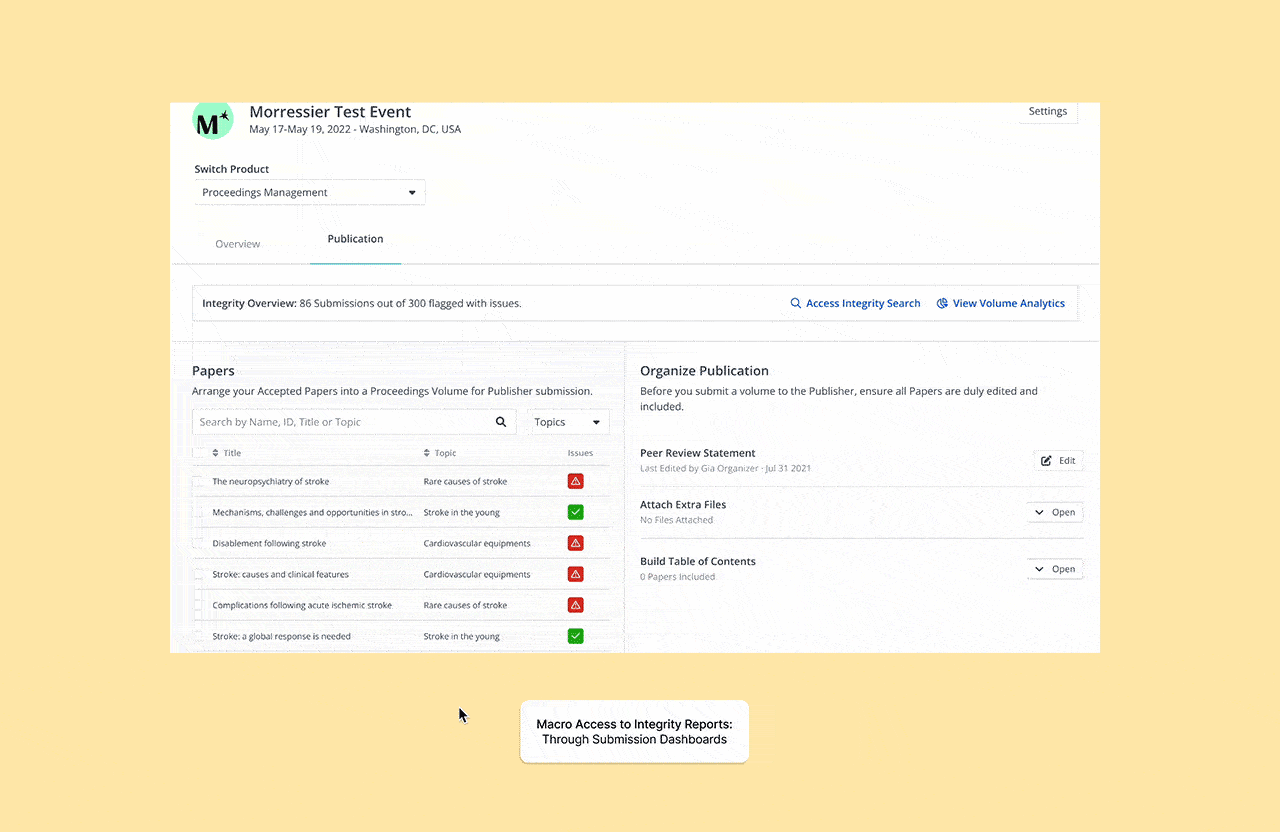
Report Access
Integrity Reports can be accessed in dashboards, or in full detail inside individual content pages.
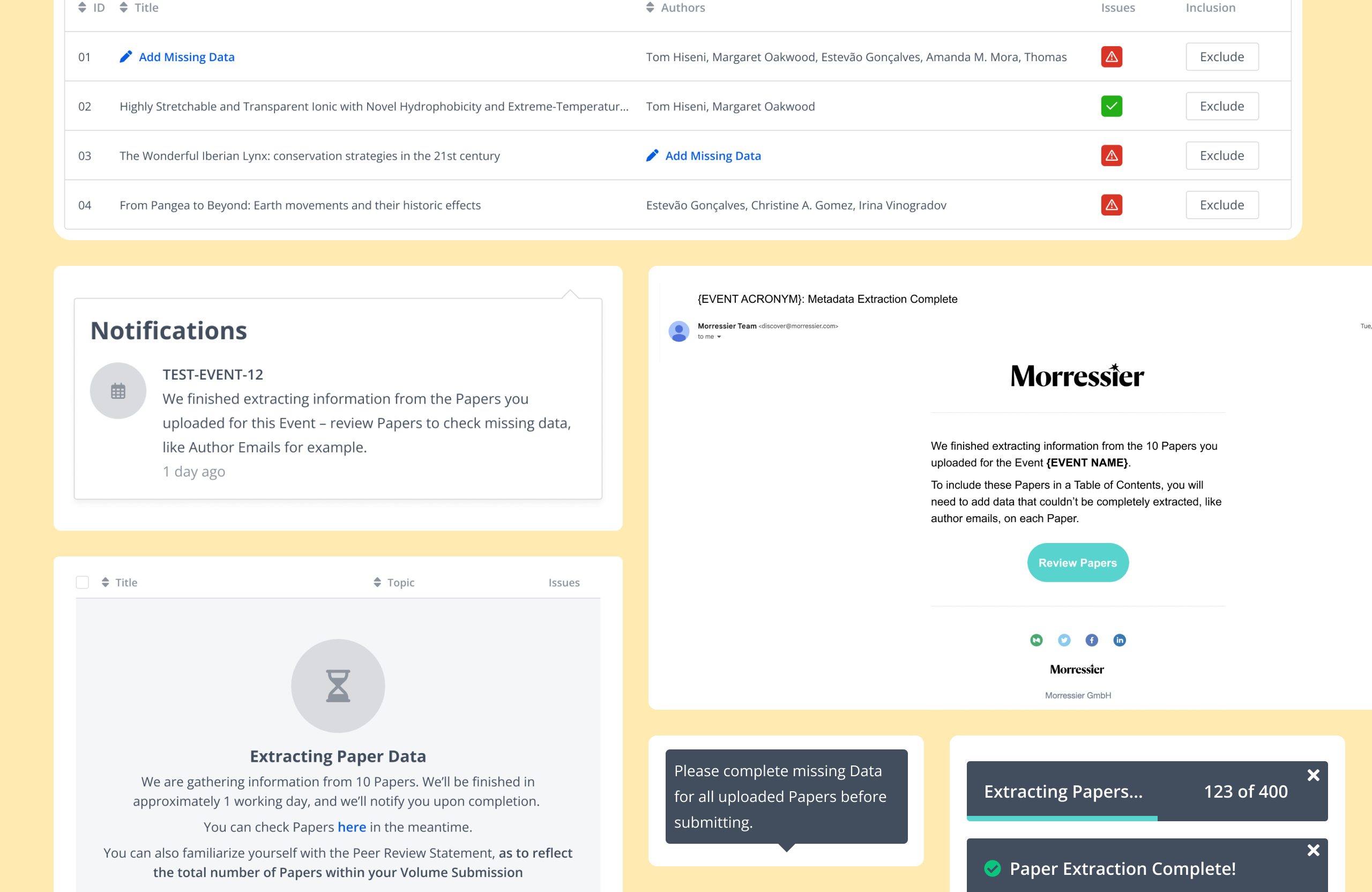
Faster Metadata Extraction
I partnered with engineers to overhaul the extraction service, and we achieved remarkable results: When uploading 500 Papers, the extraction time was reduced from 30 minutes to 4 hours to an average of just 1-2 minutes.
The catch? Lightning speed came with some accuracy trade-offs. When CS needed to step in for manual cleanups, I made sure:
- Users knew exactly what to expect (clear wait messages via email and empty states)
- Everyone could easily fix issues (visible data gaps in dashboards)
For CS teams, we built special alerts. For users doing their own cleanups, we added helpful guides and progress trackers.
The Second Iteration: Building Flexibility
From sales conversations, we learned that customers "appreciate the integrity features, but we'd like to configure them so we get the results we truly need in Proceedings Manager."
To really know what "configurable" meant, we dug into real client needs, with a series of customer interviews. Two big themes emerged:
- Some publishers don't need anything more than barebones core functionality...
- But most publishers want to control when integrity results become available to their internal teams and end users!
We embraced rapid iteration to support the company's business goals. While Q1 2024 constraints prevented a full self-service solution, we found smart ways to build configurability through...
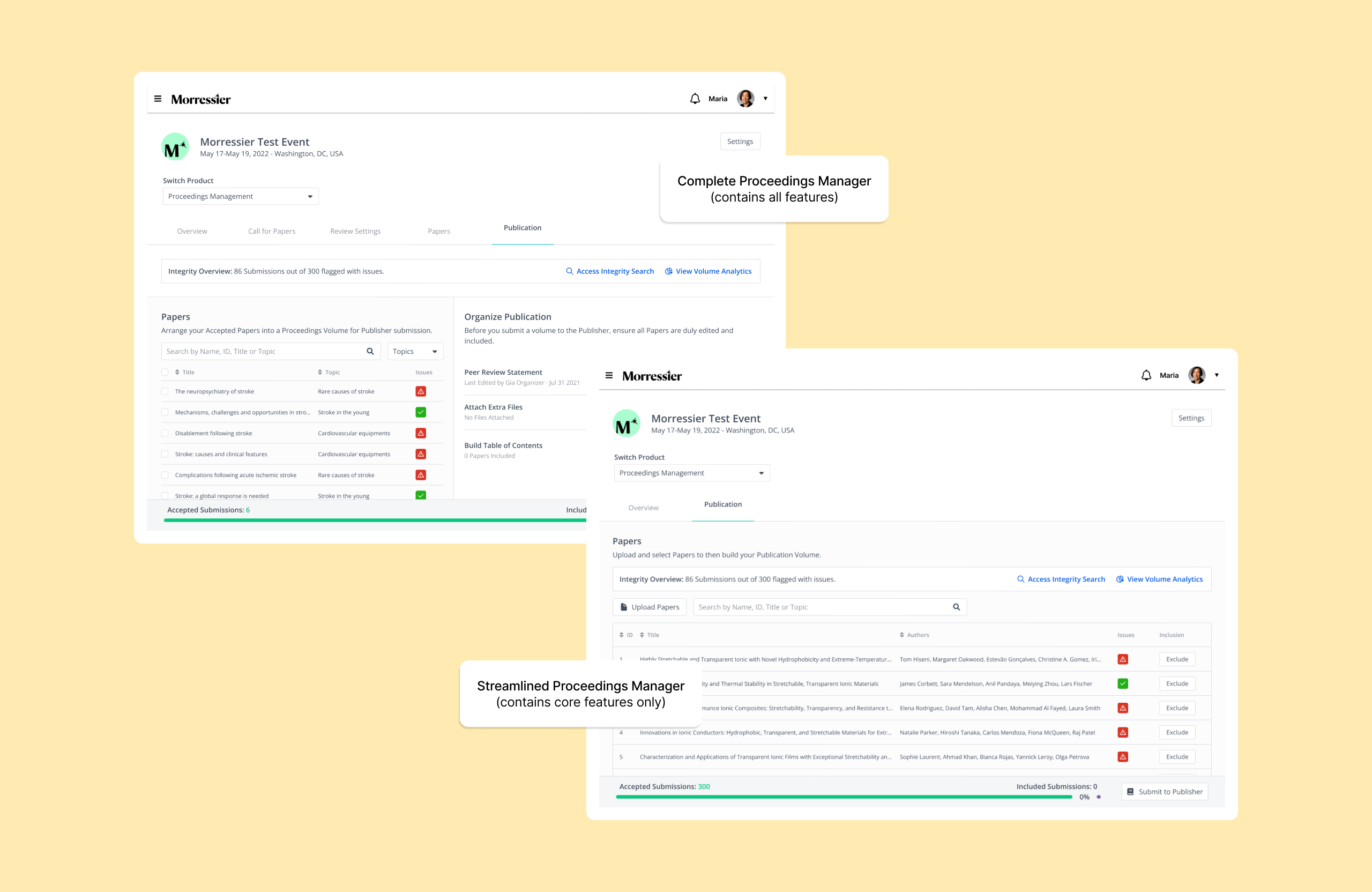
Simplified PM Versions
Clients now handpick which features to include in their PM instances, creating workflows as lean or robust as they need: a publisher might enable just bulk upload + metadata extraction features, while another adds full integrity checks to their core instance.
The UI is inspired by Lego blocks – adding, removing, and rearranging components easily with a predictable, limited set of blocks, making the UI scalable.
Phase Integrity Results
To adapt to various ways of working, Publishers can now configure PM to trigger integrity results in specific phases, and choose the appropriate timing to share them with their teams:

- When any Paper is sent to Proceedings Manager…Publishers release Integrity Data to Organizers at any time (default option);
- When a Paper is sent for Peer Review…Publishers release Integrity Results to Reviewers only, to expedite their work;
- After Handing a Volume of Research to a Publisher…Publishers release Integrity Data to Organizers only after these handover Research to them – a point when Organizers cannot edit any Research metadata.
Conclusion
The optimization of Proceedings Manager now allows users to safely process their research, with strong guidance and with integrity at the heart of the matter. By cleaning up issues left from its MVP days, users can define their own PM experience and adapt it to their specific needs. By allowing for granular controls, we empower Publishers to take the right publishing decisions so as to protect their revenue.
At the time of writing, a new customer is onboarding with a PM flow which they configured… which means I’ll be on the lookout for any valuable insights that need prioritization. A Product is never completely finished, so they say…
Impact
-4hrs
Task Time Reduction from 4 hours to an avg of 1-2 min
1
New Enterprise Customer Signature
3
New Enterprise Prospects in Pipeline
Next Steps?
For a third iteration, I'd like to create an Analytics tab inside Proceedings Manager: sourcing the data from an Integrity Manager API allows us to transpose it in an adequate space to consume it in PM, reducing friction and keeping the experience contained inside the same Product. These analytics would be paired with exclusive PM ones, so as to increase Product value.
Team Shoutout
A big big thank you to Constanza Rosenfeld (Linkedin) for reviewing this case study, for being the most supportive and insightful Design Manager one could have, and for your friendship!
A designer that works with a team that has Eri Giannaka (Linkedin), Júlio Piva (Linkedin), Afaq Khan (Linkedin), Vinay Pandya (Linkedin) and Ruwan Geeganage (Linkedin) in it, is, no doubt, in wonderful company: thank you for your feedback, for the brilliance you brought to this work, and for making private Slack channels a riot!